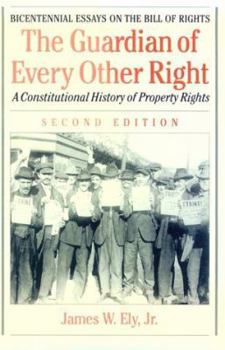The Guardian of Every Other Right: A Constitutional History of Property Rights
Select Format
Select Condition 
Book Overview
The Guardian of Every Other Right provides a comprehensive survey of the pivotal relationship between property rights and the Constitution, examining the role of property ownership from the colonial era to current controversies over land use. The text emphasizes the interplay of law, ideology, politics, and economic change in shaping constitutional thought, and provides a historical perspective on the contemporary debate about property rights. Ely...
Format:Paperback
Language:English
ISBN:0195110854
ISBN13:9780195110852
Release Date:September 1997
Publisher:Oxford University Press, USA
Length:232 Pages
Weight:0.50 lbs.
Dimensions:0.8" x 8.1" x 5.5"
Related Subjects
Americas Business Business & Finance Business & Investing Civil Rights Civil Rights & Liberties Constitutional Law Court Rules History Humanities Law Legal History Linguistics Political History Political Science Politics & Government Politics & Social Sciences Property Rules & Procedures Social Sciences Specific Topics Textbooks Words, Language & GrammarCustomer Reviews
1 rating
A very useful but tendentious introductory survey.
Published by Thriftbooks.com User , 17 years ago
This is a very well conceived survey of the history of property rights in the United States. Ely seems to see American constitutional history as having four great periods. The first period is the colonial and early national period up to the ratification of the Constitution. The second period runs from that first Washington administration up to the adoption of the Reconstruction Amendments after the Civil War. The third period runs from then until the so-called "revolution of 1937" when the Supreme Court did a turn around from its resistance to New Deal programs. From 1937 to the present time constitutes the final period of Ely's history. Obviously, from this perspective, the three great moments in U.S. constitutional history were 1. the original ratification of the Constituion, 2. the ratification of the 14th Amendment and 3. F.D.R.'s successful campaign to change the approach of the Supreme Court in 1937. To this history, Ely applies the following three analytical principles: 1. The framers of the Constitution and the Bill of Rights "envisioned some degree of federal judicial review of the substance of economic legislation" (Ely, p.9). 2. The framers did not regard personal and property rights as seperable. "Indeed, the framers saw property ownership as a buffer protecting individuals from governmental coercion." (p. 43) 3. However, property is not constitutional entitled to preferential treatment. Constitutional rights are not unlimited. In many cases, there are competing interests that must be balanced. Ely's survey of the colonial and revolutionary period serves to remind us that there has never been a period of time when property rights were granted unfettered priority. English common law had long established that there were certain public or community rights or needs that took precedence over individual property rights. This common law tradition was fortified by the developing republican ideology which saw the common good as paramount over the good of an individual. Of course, other influential political theorists like Locke placed a much higher emphasis on property rights. And early theorists of capitalism like Adam Smith were beginning to be influential. Certainly by almost any modern standard, the communal or governmental regulation of property was very minimal. The ratification of the Constitution changed quite a bit. For the most part, the Constitution relies on "institutional and political safeguards" for property. There was one clause, however, that would turn out to be essential to property rights in this country. Article 1, Section 10 states that "No State shall...pass any... Law impairing the Obligation of Contracts". Part of section 8 of Article 1 gave Congress the power to "regulate Commerce with foreign Nations, and among the several States...". This too would generate a long history of jurisprudence. The Fifth Amendment would add two other clauses that are essential to Ely's history. The first became known as the due process c





